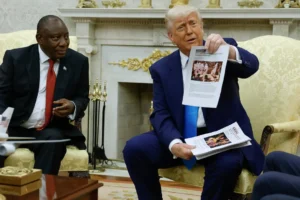
“Saving Africa, One Helicopter Safari at a Time: Johan Rupert and the Green Imperialist Peace Parks Foundation”
By J.W. Vukani (with a wink and a carbon offset)
Ah, the Peace Parks Foundation. That noble bastion of “transfrontier conservation,” gallantly drawing imaginary lines across African landscapes with the same colonial confidence Cecil Rhodes once wielded his mustache comb. And at the heart of this benevolent green empire? None other than the High Priest of Platinum, the Sultan of Stellenbosch, the bearded benefactor of biodiversity himself — Mr. Johann Rupert.
Yes, friends. When he’s not orchestrating the stock market from his vineyard throne or posing like a puppet master next to Cyril Ramaphosa (remember that photo?), Rupert is apparently saving Africa’s elephants, rhinos, and — don’t forget — the rural poor. One gala fundraiser, helicopter ride, and “community development programme” at a time.
Green Is the New Gold
Let’s talk about Peace Parks, the shimmering jewel in Rupert’s philanthropic crown. This is no ordinary NGO. This is Conservation with a Capital C. Where else can you witness the miraculous transformation of local herders into “stakeholders,” sacred land into “protected areas,” and everyday survival into a quaint “livelihoods programme”?
And the mission? “Transboundary conservation,” of course — the ecological equivalent of carving up Africa again, but this time with a green marker and a United Nations report to back you up. Move over Berlin Conference, there’s a new map in town.
Social Safeguards or Safari Safeguards?
Their latest job ad for a “Social Safeguards Lead” is particularly illuminating. Apparently, Peace Parks is suddenly concerned with human rights, safety, and dignity. Because nothing says ethical practice like hiring someone to retrofit consent after you’ve already negotiated a co-management agreement over someone else’s ancestral land.
It’s heartwarming to know they’re looking for someone to mainstream these safeguards “across all transboundary landscapes.” You know — the same ones people have lived on for generations before being gently escorted out so a German tourist could take a photo of a zebra drinking from a waterhole where their grandmother used to pray.
And let’s not forget the “grievance mechanisms” being established. That’s right, now villagers can formally complain about being relocated, as long as it’s in English, via email, and doesn’t interfere with the drone survey.
Philanthropy with a Capital P
Now to the crux: What drives a man like Johann Rupert, heir to the Richemont fortune and champion of Cartier and Montblanc, to pour millions into African conservation?
Some say it’s guilt. Others say it’s optics. But let’s be real — it’s power. And not the vulgar, obvious kind. The soothing, noble, environmentally sustainable kind. It’s the ability to occupy both the high moral ground and the high veldt at the same time.
While peasants protest at Parliament about load-shedding and food prices, Rupert retreats to Peace Parks’ sprawling “re-wilded” buffer zones, sipping Rooibos from bone china while discussing carbon credits with Davos delegates. He doesn’t just own land — he owns the narrative. Conservation as conquest, but make it eco.
The Final Frontier: Imperialism, but Make It Green
What Peace Parks does so brilliantly is repackaging colonialism as charity. The white man’s burden has become the billionaire’s biodiversity. Instead of missionaries with bibles, we now have NGOs with spreadsheets. Instead of gold mines, we now extract carbon credits, tourist dollars, and political leverage. Same game, new jargon.
So next time you see that warm, earth-toned documentary about how Peace Parks is “bridging boundaries” to “restore Africa’s ecosystems,” just remember: behind every rhino relocation is a relocation of power. And behind every social safeguard is a social sacrifice.
But don’t worry — if you have any concerns, the new hire in Stellenbosch/Remote will be happy to log your grievance, file it under “community empowerment,” and send you a lovely branded T-shirt. Provided it’s in your size.
Postscript:
To Johann, Peace Parks, and the rest of the conservation-industrial complex — thank you for saving Africa. One photo op at a time.
And if you ever need help drafting the next strategy for “people-centered conservation,” we suggest starting with… the people.
You know, the ones not invited to the donor dinner.
🦏 Brought to you by the Department of Green Imperialism and the Ministry of Sustainable Optics 🌍



